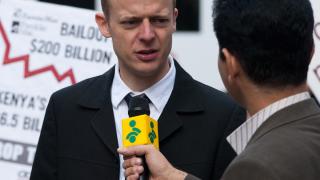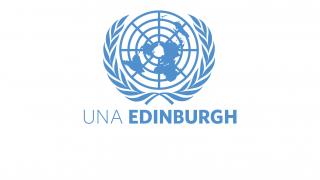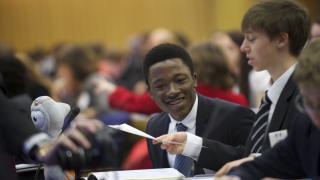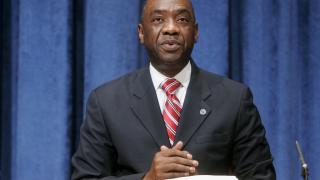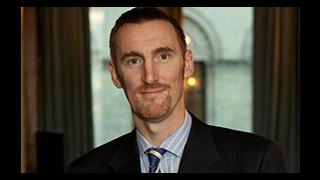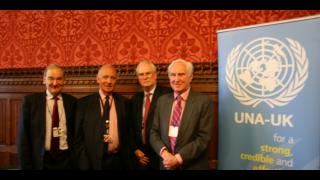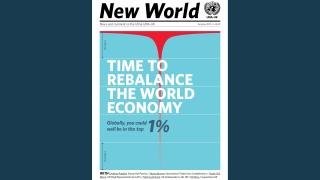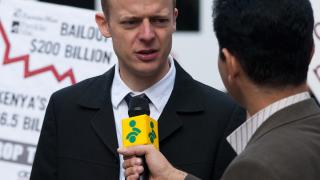
Nick Dearden speaks about his role at Jubilee Debt Campaign
- Tell us about your role at Jubilee Debt Campaign (JDC)
I'm the Director – we're small so that means doing a bit of everything. We're a pretty democratic team too.
- What was your previous experience prior to joining JDC?
Activism in university and then paid campaign experience at War on Want, working on human rights in Colombia and Palestine and workers' rights. Then a short time at Amnesty UK working up their poverty and human rights campaign – getting away from the idea that human rights are nothing to do with the economy.
- Jubilee 2000 was a landmark campaign and did much to raise awareness about third world debt. What do you think has been the greatest legacy of the campaign?
In 1998 when 70,000 people surrounded the G8 in Birmingham to call on leaders to drop the debt, few knew what the G8 was - or the WTO, IMF or World Bank. But over the next 10 years these institutions couldn't meet without massive protests. In other words, Jubilee 2000 helped people realise who was really governing the world and in whose interests. It made people realise how far global government had strayed from the interests of ordinary people. And it initiated a real alliance, though not perfect by any means, between the dispossessed of the South and the disaffected of the North. Both of which are necessary for change.
- Do you see scope for a similar campaign in the future?
Well I don't see Jubilee 2000 as a single campaign: it was part of a wider movement fighting against this form of globalisation which had started in the global South many years before. We haven't won the change we wanted, though we've had significant victories. The next stage of the 'campaign' is well underway – Occupy being the big post-financial crisis example. The NGOs we would associate with Jubilee 2000 aren't really part of this at the moment, but I hope it will come. Before it does, though, we have to accept that this isn’t a ‘development’ or ‘charity’ issue, it's about economic justice, in the North and South.
- The last year has seen protest movements around the world, from Occupy Wall Street to the Arab Spring, do you think these will have a positive effect on debt relief issues?
Well I haven't seen many mentions of debt relief in recent years. But by jubilee we don't mean simply debt relief but also major change of the financial system which generates and allows debt to 'rule' the world. The Arab Spring shows how unjust debts have built up whilst Western governments have propped up dictators. There is a danger that ‘debt recycling’ will allow debt to go on being a tool of control. The exciting thing for me is the growth of debt movements in Egypt and Tunisia. Similarly, Occupy is a cry of anger that those financial institutions which created the debt crisis in the North have wriggled off the hook. The costs are being forced onto the European public, in a similar way to the Third world debt crisis. These issues are now on the agenda and have opened up huge possibilities, but there's still a long way to go.
- In Western countries, has the call to 'drop the debt' been subsumed by the Eurozone crisis?
In many ways the Euro zone crisis supports everything we've always said about finance, the controlling role of debt and the distribution of wealth. But in another way it feels like 'drop the debt' is no longer sufficient as a call. Undoubtedly debts need to be cancelled – in Europe as well as the South – but simply cancelling a bit of debt doesn't prevent it from accumulating again. The call has to be understood more widely – it's about replacing dependency on debt with a just and progressive tax system and making finance to work in the public interest. It's about undermining, not simply dropping, unaccountable debt.
- What's your position on recent calls for the UK government to drop their commitment to giving 0.7% of GNI in aid?
Aid is both the biggest achievement and biggest failure of UK NGOs in the last 10 years. All political parties have been persuaded to reach this outdated target, but on the basis that it's a form of charity. Hence when services are under attack in the UK, people see aid as something that needs to be cut, not raised. It's associated with 'good times' economically. Instead we should have explained that 'aid' is actually a form of redistribution and restitution, and that it must be accompanied by structural changes which would bring justice to people everywhere. There are huge problems with seeing aid as the answer to global poverty. People know this is not true, especially when aid is increasingly pushed through the financial markets, perpetuating the very cause of so much poverty, inequality and injustice. The way to change this is not simply defending the need for charity, but completely re-telling the need for development.
- How does JDC garner interest in what is sometimes rather technical, dry subject matter, such as vulture funds, climate debt or the Export Credits Guarantee Department?
It's about explaining what it all really means. Most people are pretty horrified when companies buy up unjust debts for almost nothing then sue the country in question in our courts. Or the fact that the Export Credits Guarantee Department allows our government to subsidise weapons sales to dictators in Argentina and Iraq who we then end up at war with. The tricky thing at the moment is convincing activists here why they must look at what's happening in Europe if we're to have any hope of change, and how we convince people in Europe that we must look at what's going on in the South if that change is to be meaningful.
- What does JDC see as the most important reform needed to our financial institutions?
I don't think there's a single thing and that's what’s difficult – explaining to people that no one piece of legislation is the 'silver bullet'. Of course there are things to aim for – we need massive debt cancellation South and North; we need to understand that the private is not always better than the public; we need publicly controlled banks; we need capital controls, to allow governments to control money in the national interest; we need tax reforms to allow the sort of wealth redistribution any decent society needs. But none of this can be brought about without large mobilisations of people. Democracy requires people having some control over their lives, their societies and, therefore, their economies.
- Is there a role you think the UN should play in the recovery from the latest financial crises?
We need to replace the institutions that currently control the global economy with properly accountable institutions that better express sovereignty and democracy. That cannot happen anywhere but the UN. The UN has been degraded, marginalised and vilified for many years because it was seen as a threat to the powerful, but it cannot play a progressive role without change. We as NGOs, civil society and citizens of the world need to see the UN as something worth fighting for. It is ours, and we should not concede it to the powerful. We need to campaign for change at the UN and in particular to support the involvement of the global South at that level.
This is an extended version of the Young Professionals interview which appears in the printed Summer 2012 issue of New World.



